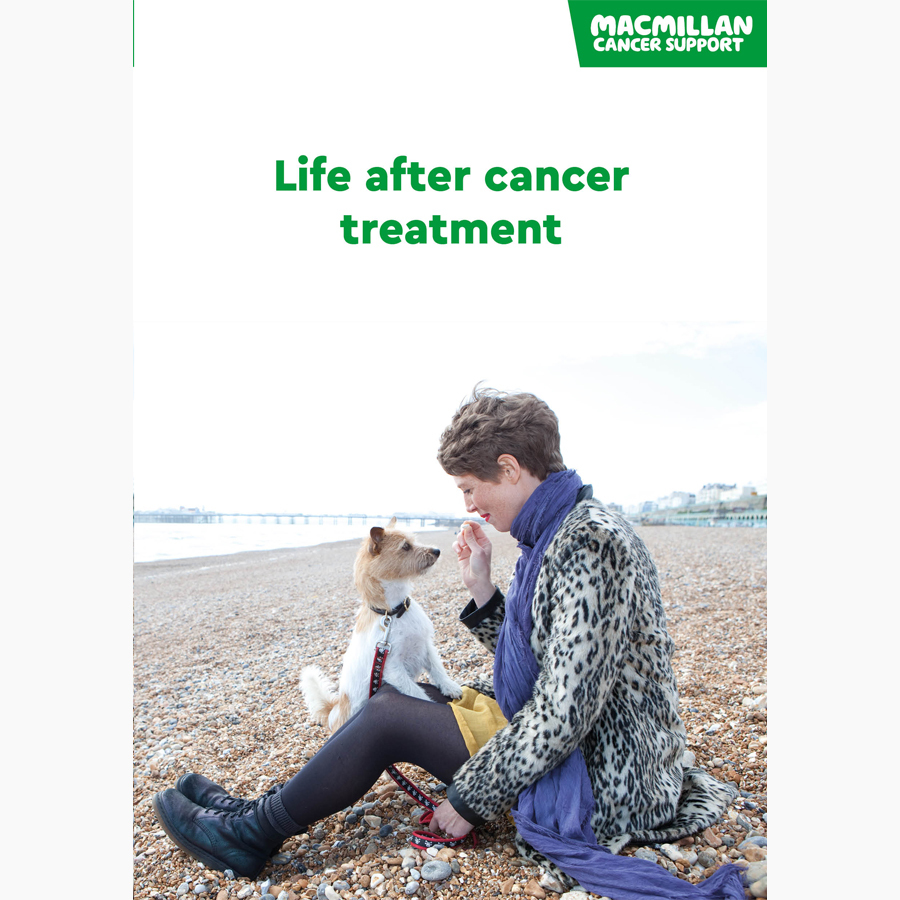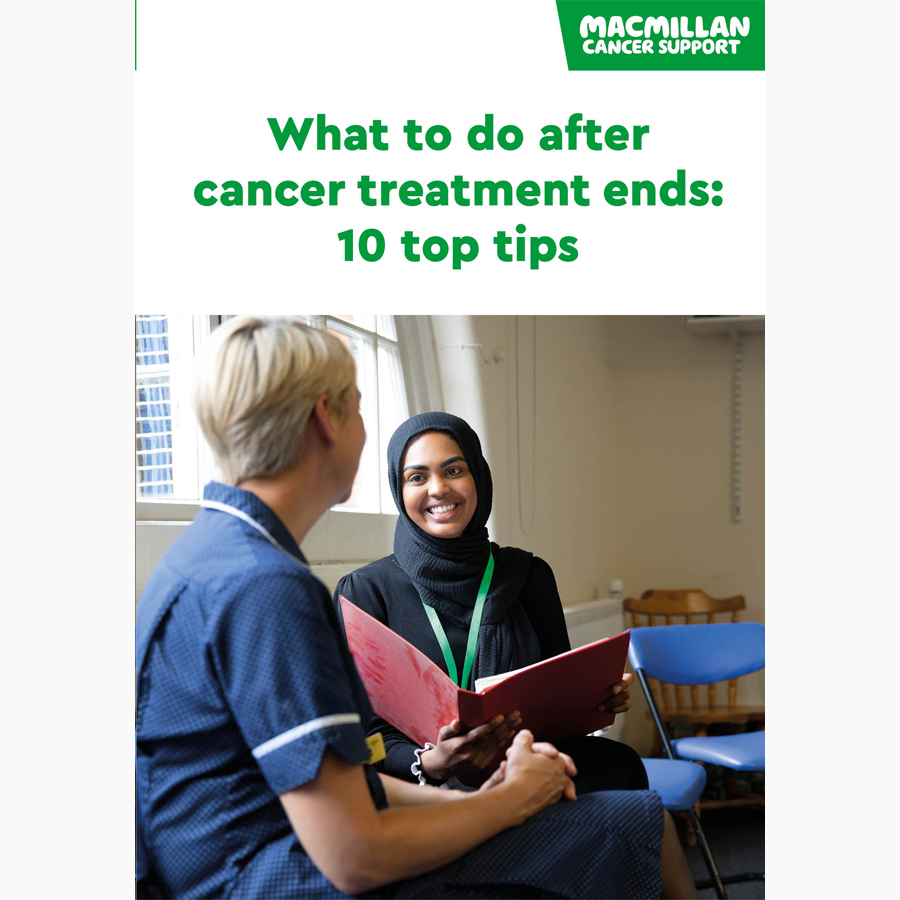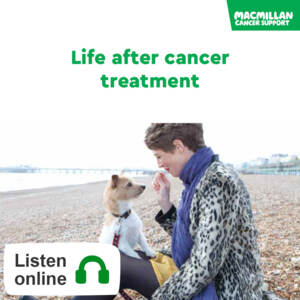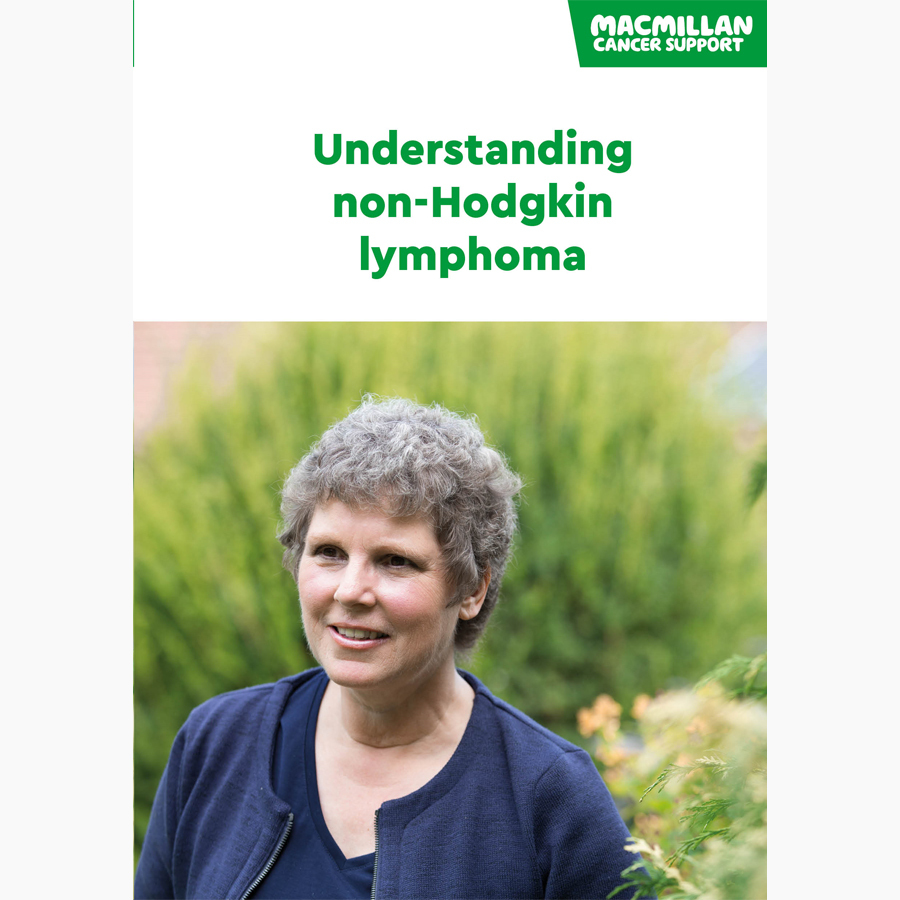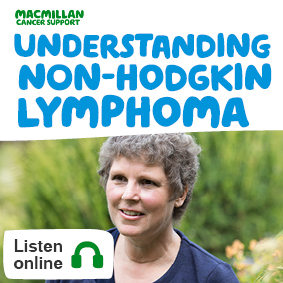What is lymphoma?
Lymphoma is a cancer of the lymphatic system. It develops when blood cells called lymphocytes become abnormal.
Normal lymphocytes fight infection. They are part of the lymphatic system. This is the system that helps protect your body from infection and disease. It is made up of fine tubes connected to groups of small lymph nodes throughout the body.
How lymphoma develops and the treatment you may need depends on the type of lymphoma. The 2 main types are:
There are also sub-types of lymphoma within these 2 main types. A doctor can only find out the type of lymphoma you have by collecting some lymphoma cells and testing them in a laboratory. If the sample contains a type of cell called Reed-Sternberg cells, the lymphoma is usually Hodgkin lymphoma. If there are no Reed-Sternberg cells, it is non-Hodgkin lymphoma.
The most common symptom of lymphoma is a painless swelling in the neck, armpit or groin.
For healthcare professionals
If you are a healthcare professional, use our guide to find the right information and support for your patients affected by lymphoma. This explains the support available from Macmillan and from other trusted organisations.
Lymphoma statistics
Non-Hodgkin lymphoma (NHL) is the 6th most common cancer in the UK. Around 14,000 people are diagnosed with it each year. It can affect people at any age but is more common as people get older. Most people diagnosed with NHL are aged over 55.
Around 2,100 people are diagnosed with Hodgkin lymphoma in the UK each year. Hodgkin lymphoma can happen at any age. It is one of the most common cancers to affect people in their teens and early 20s.
People sometimes search for lymphoma statistics to help them understand what might happen to someone in their situation. This is called prognosis. Doctors cannot predict exactly what will happen in the future. But they may use some of the following types of statistics to help them make an estimate:
- Lymphoma survival rates — this is the number of people who are alive after certain periods of time after a lymphoma diagnosis. It includes people who have no signs of lymphoma and also people who have lymphoma that has come back.
- Lymphoma recurrence or relapse rates — this is the number of people whose lymphoma has come back after certain periods of time after treatment.
- Lymphoma mortality — this is the number of people who have died because of lymphoma during a certain period of time.
You may find this information helpful, but not everyone wants or needs this type of information. Statistics can be complex and difficult to understand. They may help you understand your chances of a possible outcome. But they do not tell you what will definitely happen to you.
If you want information about lymphoma statistics, or you find numbers online that might apply to you, it is best to talk about them with your cancer doctor or nurse. They can explain:
- which statistics apply to someone with your diagnosis
- what the information may mean to someone with your diagnosis
- how this may affect any treatment decisions you are thinking about.
Related pages
Causes of lymphoma
The causes of lymphoma are mostly unknown. But some things may increase the risk of developing it, such as having a weakened immune system.
These are called risk factors.
Having one or more of these risk factors does not mean you will get lymphoma. Many people with lymphoma do not have any risk factors.
We have more information about:
Diagnosis of lymphoma
If you have symptoms, you usually start by seeing your GP. They may arrange for you to have blood tests or scans. Your doctor will refer you to hospital for tests and for specialist advice and treatment.
At the hospital, the doctor will ask about any symptoms, your general health and any illnesses you have had. They will also examine you.
If you think you may be pregnant, tell your doctor. Some tests and treatments for lymphoma can be harmful to a baby in the womb. If you are pregnant you usually still have tests and treatment for lymphoma. But it is important to talk to your doctor so they can plan your care safely.
In the video below, Dr Ranj is joined by Dr Priya Sriskandarajah to take an in-depth look at lymphoma, exploring its symptoms, stages and treatment options.
Biopsy for lymphoma
The most important test for diagnosing lymphoma is a biopsy. A doctor or nurse removes a small piece of tissue or a sample of cells from the affected area.
The most common place to take a biopsy from is an enlarged lymph node. You may have all or part of the lymph node removed.
The tissue is examined under a microscope by a doctor called a pathologist. They look for lymphoma cells and do different tests on the cells.
You may have to wait up to 2 weeks for the results of the biopsy.
Further tests for lymphoma
You will have more tests before you start treatment for lymphoma. Some tests help to show the stage of the lymphoma.
You may have other tests, such as blood tests or x-rays to check your general health and how well your heart, lungs, liver and kidneys are working.
For example, your doctor will do blood tests to check the levels of different blood cells in your blood. They may also talk to you about having blood tests to check for certain viruses, such as HIV and hepatitis.
Information from tests helps your doctors plan your treatment safely and effectively. You may have some of the following tests.
-
CT scan
A CT scan makes a three-dimensional (3D) picture of the inside of the body using x-rays taken by the CT scanner.
-
Ultrasound
An ultrasound uses sound waves to build up a picture of internal organs. It can be used to guide a biopsy. The scan helps to guide them to the exact area.
-
PET or PET-CT scan
A PET-CT scan uses low-dose radiation to check the activity of cells in different parts of the body.
-
MRI scan
An MRI scan uses magnetism to build up a detailed picture of areas of your body.
-
Bone marrow sample
A small sample of bone marrow is taken from the back of the hip bone (pelvis). The sample is sent to a laboratory to be checked for abnormal cells.
-
Lumbar puncture
In some types of non-Hodgkin lymphoma, the lymphoma cells may get into the fluid that surrounds the brain and spinal cord. You may have a lumbar puncture to take a sample of this fluid.
Waiting for test results can be a difficult time, we have more information that can help.
Related pages
Booklets and resources
Staging of lymphoma
Knowing the extent of the lymphoma helps your doctor plan the right treatment. This is called staging.
Grade of non-Hodgkin lymphoma
Non-Hodgkin lymphoma is also grouped as either low grade or high grade. Low grade lymphomas grow very slowly. High grade lymphomas grow more quickly. The grade of NHL is important in deciding your treatment.
You can find out more about:
Lymphoma treatment
A team of specialists will meet to discuss the best possible treatment for you. This is called a multidisciplinary team (MDT).
Your doctor or cancer specialist nurse will explain the different treatments and their side effects. They will also talk to you about things to consider when making treatment decisions.
The treatment you have will depend on:
- the type and stage of the lymphoma
- its grade (if you have non-Hodgkin lymphoma)
- the symptoms you have
- which parts of your body are affected
- your general health
- your preferences.
You can find out more about:
You may have some treatments as part of a clinical trial.
After lymphoma treatment
People often have many different feelings when they finish lymphoma treatment. You may feel relieved that treatment has finished, but worried about what will happen in the future.
You will have appointments with your lymphoma doctor or nurse less often than before. But at the same time, you may have new challenges to cope with and things to think about.
We have information below about some of the things people ask about after lymphoma treatment. But you may have other questions or need information about something else. If there is something you want to talk about at any point after treatment, you can:
- call the Macmillan Support Line free on 0808 808 00 00
- chat to our specialists online
- visit our Online Community to talk to people who have been affected by lymphoma, share your experience, and ask an expert your questions.
Related pages
Lymphoma follow-up
Related pages
Side effects of lymphoma treatment
You may have some ongoing side effects as you recover from lymphoma treatment. You can use our impacts of cancer A-Z to search for information about managing different symptoms and side effects. Or find out more about side effects of treatment for Hodgkin lymphoma or treatment for non-Hodgkin lymphoma.
-
Tiredness and fatigue
Tiredness (fatigue) often affects people with cancer. It can be caused by lymphoma or be a side effect of lymphoma treatment. RESTORE is an online resource that aims to help people living with cancer related fatigue.
-
Sexual well-being
Lymphoma and its treatment can sometimes affect your sex life. There are ways to improve your sexual well-being and to manage any problems.
-
Fertility
Treatment for lymphoma may affect your fertility. If you are worried about your fertility it is important to talk with your doctor before you start treatment. We have more information about:
Sometimes side effects may continue or develop months or years after treatment. These are called late effects. We have more information about long-term and late effects of treatment for lymphoma.
Well-being and recovery
It can take time to recover after lymphoma treatment. Some days you may feel better than others.
It is important to know where to get support or information if you need it. People often need support even some time after lymphoma treatment. But sometimes it is difficult to know who to ask for help. To find support:
- ask your GP or someone from your cancer team for advice about support in your area
- search cancercaremap.org to find cancer support services near you
- call us free on 0808 808 0000 or talk to us online - our cancer information and support specialists can offer guidance and help you find what you need.
Our course Help to Overcome Problems Effectively (HOPE) helps people during and after cancer treatment. It is a free, interactive, group based, self management support course. It runs for 6 weeks, with each weekly session lasting 2.5 hours. To find out more about HOPE courses in your area, email ServiceOpsSupport@macmillan.org.uk
A healthy lifestyle can help speed up your recovery. Even small lifestyle changes may improve your well-being and long-term health.
Related pages
Booklets and resources
Support for people with lymphoma
Talk to someone about lymphoma
Macmillan is here to support you. If you would like to talk, you can:
- call the Macmillan Support Line free on 0808 808 00 00
- chat to our specialists online
- visit our Hodgkin lymphoma forum or our non-Hodgkin lymphoma forum to talk with people who have been affected by lymphoma, share your experience, and ask an expert your questions.
More information and advice
We know cancer can affect you physically, emotionally and financially. We have information and advice about different ways cancer might impact you, such as help with:
Watch Yamour talk about her NHL diagnosis
You can watch Yamour and her mother, Isaf, discuss Yamour's diagnosis of non-Hodgkin lymphoma. This video is part of our Mother Tongue series of stories about the impact having cancer information and support in a different language has had on people using our services.
Other organisations who offer information and support
The organisations below also offer information and support:
-
Blood Cancer UK
Blood Cancer UK offers support and information to people affected by blood cancers, including lymphoma.
-
Lymphoma Action
Lymphoma Action provides high quality information and support for people affected by lymphoma. It provides helpline services and a range of peer support including online support meetings, educational events and webinars. Its website includes TrialsLink, a database of lymphoma clinical trials.
Supporting someone with lymphoma
When someone you know is diagnosed with lymphoma, it can be difficult to know how to support them. You may want information to help you understand what they are going through. Or you may be worried about what to say.
We have information to help with the practical, emotional and financial impacts of supporting someone. You can also talk to us by:
- calling the Macmillan Support Line
- using chat online
- visiting our family and friends forum to talk with people who are supporting someone with cancer, share your experience, and ask an expert your questions.
Booklets and resources
Access our lymphoma information in other formats
We are working to make our website as accessible as possible. We want everyone to be able to use it to find the information they need. We have tips about using settings on your computer or device to help you use our website in our accessibility statement.
We also provide information in a range of languages and formats. If you cannot find the information you are looking for in the format or language you need, email us at cancerinformationteam@macmillan.org.uk
Download our lymphoma booklets
Our lymphoma booklets are available to download as a pdf, ePub or Mobi format:
Booklets and resources
Listen to our lymphoma audiobook
You can listen to our Understanding non-Hodgkin lymphoma audiobook. You can also search our full range of audiobooks.
Booklets and resources
Find lymphoma information in your language
We have a range of translated cancer information. This includes information about different cancer types, being diagnosed, cancer treatment, and side effects. We have some lymphoma information in the following languages. You can also search our most up to date list of web pages we have translated on request.
- Bulgarian - Mantle cell lymphoma / Мантелноклетъчен лимфом [PDF]
- Farsi - Hodgkin lymphoma / لنفوم هوچکین [PDF]
- German - Follicular lymphoma / Follikuläres Lymphom (FL) [PDF]
- Gujarati - Hodgkin lymphoma / હોજકિન લીમ્ફોમા [PDF]
- Polish - Diffuse large B-cell lymphoma (DLBCL) / Chłoniak rozlany z dużych komórek B [PDF]
- Polish - Hodgkin lymphoma / Chłoniak Hodgkina [PDF]
- Polish - Lymphoma / Chłoniak [PDF]
- Slovak - Anaplastic large cell lymphoma (ALCL) / Anaplastický veľkobunkový lymfóm [PDF]
- Slovak - Follicular lymphoma / Folikulový lymfóm [PDF]
- Tamil - Follicular lymphoma [PDF]
If you would like any of our lymphoma information translated into your language, please email cancerinformationteam@macmillan.org.uk
Watch British sign language videos
You can watch our BSL videos about cancer on YouTube.
Find our easy read booklets
Our easy read booklets use simple words and pictures to tell you about cancer. They can be useful if you want information that is easier to understand.
Looking for large print, Braille or another format?
If you would like our information in a different format such as large print or Braille, email us at cancerinformationteam@macmillan.org.uk or call us free on 0808 808 00 00.
About our information
-
References
Below is a sample of the sources used in our lymphoma information. If you would like more information about the sources we use, please contact us at cancerinformationteam@macmillan.org.uk
National Institute of Health and Care Excellence (NICE). Blood and bone marrow cancers. NICE Pathways. Last accessed 3 December 2020.
Hodgkin lymphoma: ESMO Clinical Practice Guidelines for diagnosis, treatment and follow-up; European Society for Medical Oncology (2018).
Non-Hodgkin’s lymphoma: diagnosis and management; NICE Guideline (July 2016).
Newly Diagnosed and Relapsed Follicular Lymphoma: ESMO Clinical Practice Guidelines for diagnosis, treatment and follow-up; European Society for Medical Oncology (2020).
-
Reviewers
This information has been written, revised and edited by Macmillan Cancer Support’s Cancer Information Development team. It has been reviewed by expert medical and health professionals and people living with cancer. It has been approved by Senior Medical Editor, Professor Rajnish Gupta, Macmillan Consultant Medical Oncologist.
Our cancer information has been awarded the PIF TICK. Created by the Patient Information Forum, this quality mark shows we meet PIF’s 10 criteria for trustworthy health information.
Date reviewed
This content is currently being reviewed. New information will be coming soon.

Our cancer information meets the PIF TICK quality mark.
This means it is easy to use, up-to-date and based on the latest evidence. Learn more about how we produce our information.
How we can help




